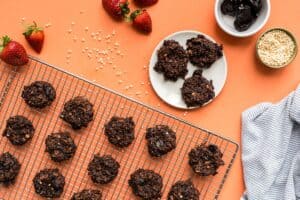At Happy Healthy Eaters, we strive to use inclusive language and we’re learning along the way. In this blog post, we interchangeably use the words human milk and breastmilk, as well as chestfeeding/breastfeeding. Please insert what speaks to you!
Does formula feeding your baby feel like a secret? Have you ever felt “bad” for making the decision to use formula? Or, maybe someone shamed you? Fear mongered you? We’ve heard it all.
While the public health messaging to increase breastfeeding rates is well intentioned, it has also come with an unintended consequence of making formula feeding parents feel ashamed or “lesser than.”
If you feel this way, it may be hard to ask your healthcare provider, your friends, your family… ANYBODY questions you might have about formula!
We polled Instagram parents about how they were left feeling about feeding formula. Here are the results:
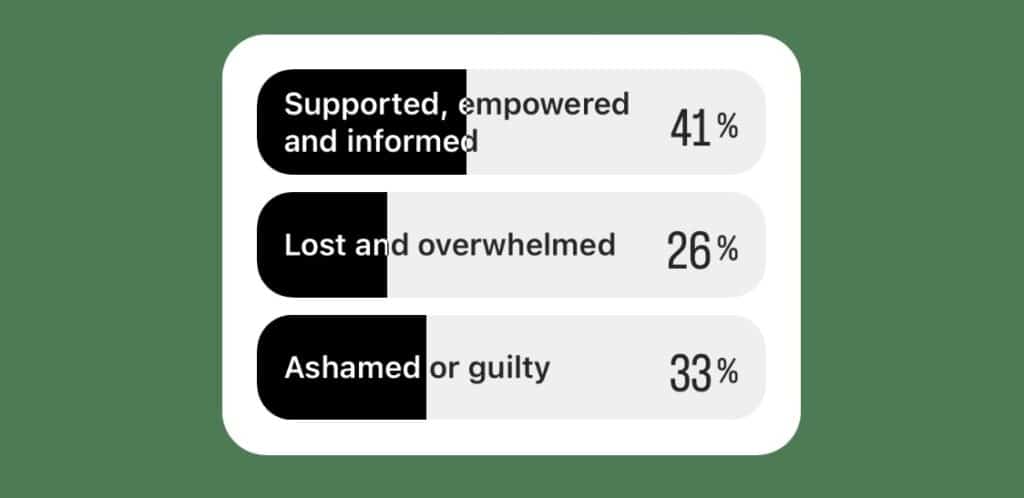
Here at Happy Healthy Eaters, we see you and we aim to be a safe place for ALL your infant feeding questions.
We are Registered Dietitians – our expertise lies in food and nutrition so that means we pride ourselves in learning about human milk, formula and all things solids which is what you’ll find in our community!
It is well known that human milk is the preferred source of nutrition for babies whenever possible – not only is it nutritionally complete but it also has beneficial components that cannot be replicated by formula.
And this is when two truths can be true: human milk is wonderful and so is formula.
Ultimately the decision to feed your baby breastmilk or formula is yours as a parent. As dietitians with a focus on babies and toddlers, it is our job to ensure allllll parents are educated on how to adequately and safely feed their little ones no matter if they feed breastmilk or formula.
In previous blog posts, we’ve shared our knowledge on the wonders of human milk, as well our own experiences as breastfeeding moms. And while we’ve started to cover the ins and outs of formula feeding on our Instagram account, we’ve been wanting to get into the nitty-gritty of it all on the blog – so here we are!
Below we’ve compiled some of your most asked questions about infant formula along with up-to-date evidence-based answers.
We’ll admit – there is A LOT of information in this post. You may want to jump to the sections that spike your interest with our drop-down index below.
So, let’s get into it!
Table of Contents
Is Baby Formula Safe? Is Formula Good for Babies?
In recent years formula has been under some scrutiny after several brands of powdered formula were recalled due to bacterial contamination from Cronobacter sakazakii or Salmonella–this happened both in Canada and the US.
When this happened, it was not only heartbreaking to hear about the families impacted, but it really questioned consumers’ ability to trust manufacturers. Thankfully, incidents like this are rare and strict audits and protocols are put in place to ensure it doesn’t happen again.
Maybe many of you recall this incident and the series of shortages that made accessing formula so challenging for parents. It was a sad time in infant formula history and our understanding is that the industry is still recovering, and learning.
All of this said, formula approved for commercial sale in Canada must meet very specific nutritional and safety standards. So, our answer here is a resounding YES! If baby formula is manufactured, stored and prepared correctly (more on that later) it is most definitely safe for babies to consume. In fact, when prepared in a particular manner, you can eliminate any potential bacteria in powdered infant formula.
If you are feeding your baby formula please know you will be providing them with a source of nutrition that is safe, nutritious, and supports their growth and development.
What’s Inside My Baby’s Formula?
While you may hear fear-mongering-type messages that try to scare you away from long ingredient lists, all the ingredients you see listed on a package of baby formula are there for an intended purpose – to meet the nutritional needs of babies. On the formula ingredient list, you will see sources of macronutrients (carbohydrates, proteins, and fats) and micronutrients (i.e.vitamins and minerals). For brain development alone, babies need more than 40 different nutrients every single day!
In order for a formula to be permitted for sale, it must meet a baseline standard for these key nutrients–companies don’t have a choice in the matter.
However, manufacturers may have some “extras” added. You can think of these as “nice to have” but not mandatory. Here are a few optional ingredients you may see listed:
- DHA, a type of omega-3 fatty acid
- Lutein
- Probiotics
- Prebiotics
- Oligosaccharides
Formula manufacturers may use different ingredients for a variety of reasons based on emerging evidence. Some of those reasons include:
- to more closely mimic breast milk
- to support eye health
- to meet the needs of babies with allergies or sensitivities
- to meet parental preferences
All of these “nice-to-have” ingredients must also be pre-approved before being added to formula.
We all know babies do not come “one size fits all”. So it’s impossible to think one formula will serve every single baby perfectly. Personally, we are impressed with formula innovation!
For example, some babies benefit from a gentle formula that contains less lactose and is partially hydrolyzed. Meanwhile, other babies really benefit from soy formula. Having options and choices is helpful for parents.
Let’s take a further look into some ingredients you might find in formula:
Palm Olein (PO):
- This is a source of fat that may be added to formula to closely mimic the type of fat found in human milk (palmitic acid to be exact).
- PO has been shown to cause harder stools in some infants, cue the constipation! If you find this to be true for your baby, you may wish to find a formula without this ingredient.
- All in all, please know that PO is a safe, well-researched ingredient and there have been no differences in growth or weight in infants fed formula with or without it.
Seed Oils (i.e. Canola Oil):
- Seed oils are used as sources of fat in formula. Canola is specifically used to mimic the types of fat found in breastmilk as it is high in oleic acid, a type of fatty acid found in human milk.
- Canola oil is Canadian (yaay!), nutritious and economical which is also an important consideration given there is a huge cost to purchasing formula.
Corn Syrup:
Corn syrup may be listed as an ingredient in some formulas. Why?
- Because it provides babies with an alternate source of carbohydrates in low lactose formulas that they can digest and utilize efficiently. We have to remember that babies are not like adults. They cannot be offered more complex carbs such as oats, buckwheat, or quinoa as an energy source.
- It is an economical source of carbohydrate. This allows formula companies to meet nutrition standards and stabilize the cost of formula for families (something that is important in today’s world of skyrocketing food prices!)
- Something else to keep in mind is that the corn syrup is not the same as high fructose corn syrup you might find in commercial products. Often folks think the two are the same, but they aren’t! Regularly old corn syrup actually contains virtually no fructose at all.
- Lastly, it might be helpful to understand that when lactose (a carbohydrate) is removed from formula (let’s imagine a baby who is born before term and isn’t digesting lactose efficiently) we are removing an energy source. So, an energy source needs to be added back in. Usually, it’s corn! This is why corn syrup is seen in gentle, partially hydrolyzed, extensively hydrolyzed and amino acid-based formulas.
- It is an economical source of carbohydrate. This allows formula companies to meet nutrition standards and stabilize the cost of formula for families (something that is important in today’s world of skyrocketing food prices!)

Should I Buy Organic Formula for my Baby?
This is something super important to note: “organic” does not mean a product is healthier, more holy or superior to a “non-organic” or conventional product – this is just as true with breakfast cereal as it is with infant formula and we stand by it!
Moreover, in today’s landscape of rising food prices, we don’t want parents (who may already be struggling to feed their families) to feel they are giving their babies “less healthy” or inferior food if they choose conventional formula.
However, if choosing organic products is important to you and fits your budget, go for it! We’ve noted that there are many non-GMO and organic formulas on the market which is likely due to consumer demand…and a whole lot of fear mongering! But that’s a whole other blog post!
Suggested reading: Should I buy organic food for my family?
What Baby Formula is Best? What Formula Should I Feed My Baby? What Baby Formula is Closest to Breastmilk?
Spoiler: there is no BEST formula on the market.
As dietitians we are not here to tell you what formula to pick for your baby.
Instead, what we ARE here to do is educate and support you in navigating the “formula jungle” so you can make an informed and empowered choice for your baby.
The best formula for your baby is
…the one they tolerate
…the one they accept
…the one that supports their optimal growth + development
…the one you have access to
…the one that suits you as a parent.
Soooo, a better question might be – how do I choose the formula that is going to be the best fit for my baby and family?
With that question in mind, you’re going to want to take a few things into consideration:
- Your baby’s individual medical history
- Cost
- Availability
- Caregiver preferences
First you’re going to want to pick the category of formula your baby will likely tolerate based on their medical history. To keep things simple, assuming your baby is full-term, with no cow’s milk protein allergy (more on that later), and you are not a fully plant-based household, a standard cow’s milk-based formula will be a good starting point.
These formulas are typically the ones closest to breastmilk in the types of carbs, fats, and proteins they include, plus they’re often the most economical. If you’d like a little more guidance on how to initially determine which type of formula might be the best fit for your baby – check out our graphic below.
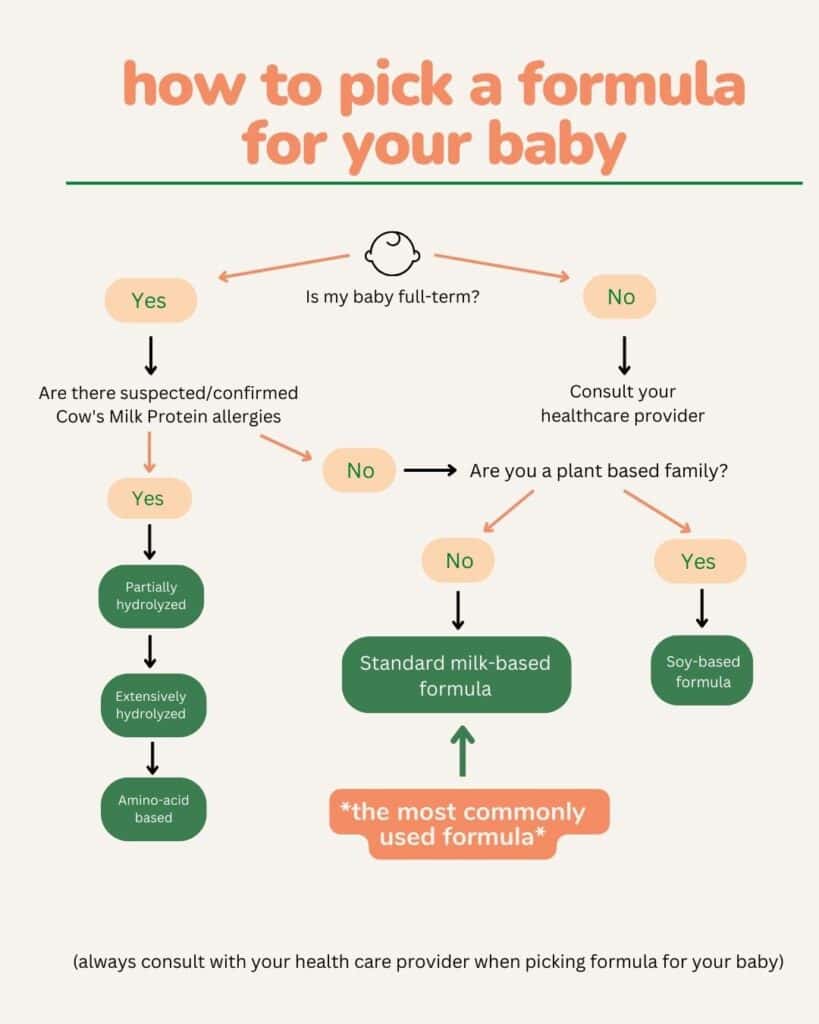
Once you’ve determined the category of formula you’re going to buy you can start asking other questions like:
- What can our family afford to spend on formula?
- What formula is available to me consistently?
- What am I willing to do to prepare my baby’s formula?
- Is buying an organic product important to me?
- Do I have a preference in the sources of carbs, protein, and fat that are in the formula I purchase?
We understand initially this may seem like a lot to consider. The thing is, once some of the questions above are answered, we find parents are better able to narrow down their options and make an informed decision confidently. And again, we always recommend reaching out to a supportive healthcare professional who is familiar with your baby and family choosing a formula for your baby.
What is The Best Baby Formula for Sensitive Tummies/Gas/Colic/Constipation?
In many cases, babies are able to tolerate the formula they initially start on. Other times, parents may find their babies struggle with symptoms such as colic, gas, fussiness, or constipation prior to or after starting formula and wonder if switching formulas could help alleviate symptoms.
And the answer to their question is…maybe. There are some ingredients in formulas that have shown to contribute to some of these symptoms in some babies. For example, palm olein contributes to constipation for some babies and switching to a formula with different ingredients may alleviate this.
In addition to “standard” formula, you’ll also find “partially hydrolyzed” formulas. “Partially hydrolyzed” is a scientific way of saying some of the proteins in these formulas are broken down which may improve a baby’s tolerance to the formula. And while these formulas are marketed to reduce gassiness/fussiness or manage reflux, the research around these formulas’ ability to improve symptoms is not conclusive. That being said, if a baby is suffering from gas or fussiness, trying a partially hydrolyzed formula doesn’t hurt and some parents report these formulas have helped improve their babies’ symptoms.
How do I Know if My Baby is Allergic to Formula?
In most cases, if a baby has an allergy to formula it will be to one of the proteins found in that formula, for example cow’s milk protein or soy protein.
The “classic” allergy in which someone carries around an EpiPen for emergency is called an IgE allergy. IgE is a type of antibody that is involved in this allergic response. Signs of an IgE allergy could include these symptoms:
- skin symptoms (eczema, rashes, hives, swelling of lips and face)
- gastrointestinal symptoms (nausea, vomiting, diarrhea, blood in stools)
- breathing symptoms (runny nose, wheezing, trouble breathing, speaking or swallowing)
These symptoms usually arise immediately or within a few hours after the allergen (food someone is allergic to) is consumed. If your baby exhibits any of these symptoms, we recommend you connect with your healthcare provider as soon as possible – they will help you navigate the allergy and determine which formula will be safe for your baby.
IMPORTANT: Call 911 immediately if your child has problems breathing or swallowing, or has swelling in their mouth or tongue.
There are also non-IgE allergies. These types of allergies are not assisted by an EpiPen.
Symptoms of non-IgE allergies may include:
- blood in the stool
- vomiting, diarrhea
- failure to thrive (not growing as well as expected)
- anemia
If either an IgE or non-IgE allergy is diagnosed, your healthcare provider will work with you to find an alternative formula for your baby to tolerate. Each case is unique.
How do I Prepare Formula for My baby?
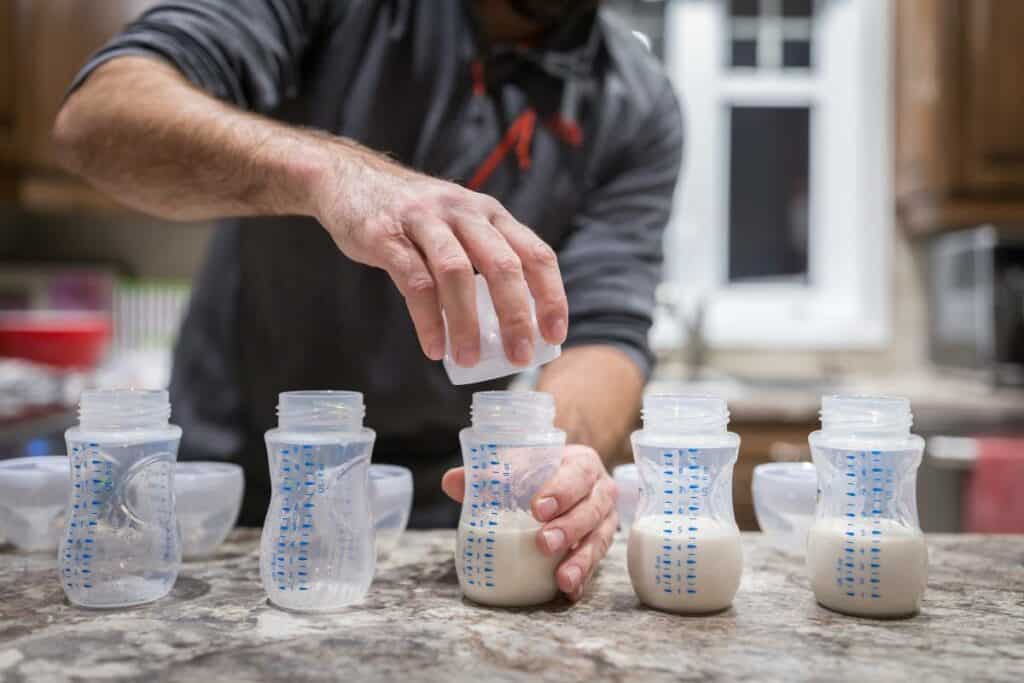
How you prepare formula for your baby is going to depend on a few things:
- the type of formula you purchase (powdered, liquid concentrate, ready-to-feed)
- the age of your baby
- where in the world you live – each country has its own detailed instructions for how to prepare formula safely
With this in mind, our best advice here is to check with your healthcare provider and/or health region on the best way to prepare formula for your baby. If you live in Canada, this is a good place to start. And if you’re in the US check this out.
For some families, batch prepping formula is a game changer! But for others, especially those who are combo feeding or if you’re feeding on-the-go, prepping each bottle individually makes more sense!
A note about baby formula prep machines:
Over the past few years “baby formula prep machines” have come on the market with the promise of making formula feeding a breeze. The thing is, these machines have some concerns around safety standards (i.e. for storage and temperature of water, quality and consistency of the formula dispensed) are not being met.
Since safety is a number one priority when it comes to feeding babies, we would caution against purchasing and using these machines, especially if your baby was born prematurely, was born at a low birth weight, is not meeting growth milestones, or is immunocompromised. If you do choose to use one, please follow the recommended cleaning guidelines closely.

How Much Formula Should I Feed My Baby?
Trust us, we know many parents would love an answer to this question that comes in a neat table with specific amounts for babies of various ages. And we get it! You want to ensure your baby is getting all the nutrition they need. The thing is, the amount of formula your baby needs is going to vary day to day, just like the amount of food you or I eat varies on any given day. To add, different babies of the same age are going to consume different amounts of formula.
Instead of focusing on a specific volume of formula, we encourage you to focus on your baby’s hunger and fullness cues. Not only is this going to help you know when your baby wants to eat and when they are finished, but it’s also going to set the stage for a positive feeding relationship between you and your baby that will serve you well through toddlerhood and beyond.
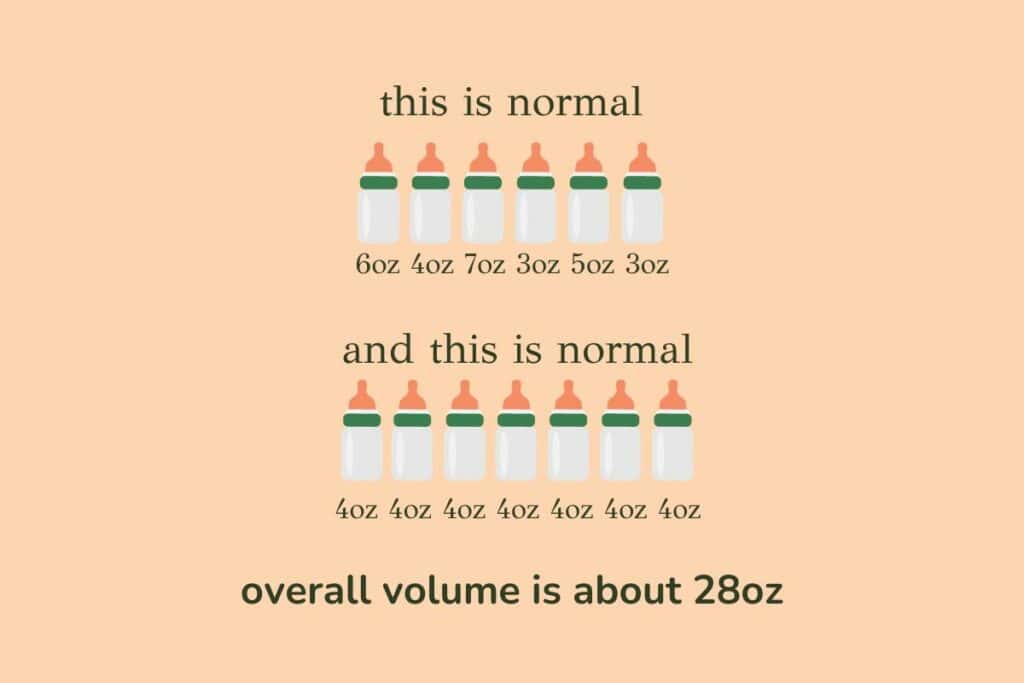
Signs Baby is Hungry:
- Smacks or sucks lips
- Searches with an open mouth
- Sucks on hands or fists
Signs Baby is Full:
- Closes mouth
- Turns head away
- Falls asleep
- Fists relax into an open hand
All that being said, if you’d like a general guide of amounts of formula to prepare for your baby, this handout from Alberta Health Services is a good place to start.
How do I Know if My Baby is Getting Enough Formula?
There are two main ways to tell if your baby is getting enough formula! The first one is something you can monitor day to day and the second is something to track long term.
Day by Day: Count the number of wet and dirty diapers your baby has. Depending on where in the world you live the specific recommendations may vary so be sure to check with your health region on this one (if you’re in Canada check out this website for a guide).
Long Term: Another way to tell if your baby is getting enough formula is if they are meeting their expected growth along their curve. Your doctor should be able to help you accurately figure this one out. As always, we’d encourage you to trust your gut – if you have concerns about your baby’s intake (at any time) don’t hesitate to reach out for help right away.
How Long Will My Baby be on Formula? Do I Need to Switch to Stage 2 Formula?
Long story short, should you choose to feed your baby formula (or a combo of human milk and formula), your baby will be on formula until close to 12 months of age. From birth until babies start solids (around 6 months of age) breastmilk or formula provide all the nutrition your baby needs.
Once they start solids, you will slowly see their intake of formula decrease as their intake of solid foods increases (here’s a cool visual of this progression). Finally, once they reach 12 months of age, you can transition them off formula and on to whole cow’s milk or a “new” milk.
For more on transitioning your baby off formula see our blog post “Best Milk for Babies: A Dietitian’s Guide to Safely Introducing Baby to Milk”
You may have seen “stage 2” formulas on the market. These formulas are marketed for babies 6 – 12 months and often contain more of certain micronutrients such as iron, calcium, and phosphorus. While babies’ requirements for some of these nutrients do go up around 6 months of age, this is also the time babies start consuming solid food – which also offers these nutrients! You can feel free to switch to a Step 2 formula at 6 months of age but you definitely don’t have to.
Start Solids Confidently
Does Baby Formula Expire? Can Baby Formula Go Bad?
Baby formula is one of the few foods that actually have an expiry date!
Most foods have a best before date, which is exactly what it means: the quality of the food will be best before this date! Afterwards, the quality may go down but you can use your discretion to determine whether it’s still safe to eat.
In contrast, formula should not be offered to babies after the expiry date. At this point, some of the nutrients may have degraded and your baby wouldn’t be getting everything he or she needs to grow and thrive! This is a big deal since babies are relying heavily on formula to provide their nutritional needs!
Is Homemade Formula Safe? How Can I Get Baby Formula During A Shortage?
Due to the recent formula shortages in Canada and the US, these are two questions we’ve heard A LOT lately. And while we want to be sensitive to your concerns, we also want this message to come across loud and clear – homemade formula is NOT safe for babies to consume. Sorry (not sorry) to be so blunt, but the research in the area is clear. Homemade formula is not safe for a number of reasons including:
- lack of essential nutrients (which can lead to long-lasting adverse health outcomes)
- increased food safety risks
- higher than recommended levels of nutrients (i.e. vitamin A)
If you find yourself in a situation (i.e. financial struggles, formula shortages) where commercial formula is difficult to access please reach out for help right away – there are many programs available to help parents get access to the formula they need. These programs and resources are often very location specific. Your doctor, a social worker, a public health nurse, or a registered dietitian should be able to assist you in accessing the resources you need.
Of particular interest, Health Canada released information for families on the limited supply of infant formula with additional directions, you can see that here and learn more about what they are doing to support families.
Are you still with us?! As you can see there is a lot to know about the world of baby formula. Hopefully we’ve helped you navigate that world and brought you clarity and confidence in deciding what to feed your baby and how to go about it.
If you have more questions on formula feeding or anything else related to feeding your littles – reach out to us. Feeding babies and supporting their optimal growth and development with nutrition is our fight song, we’re happy to help if we can.
shop this post
More Articles Your Family Will Love







References:
- https://www.cdc.gov/nutrition/InfantandToddlerNutrition/formula-feeding/infant-formula-preparation-and-storage.html
- AHS Infant Formulas for Healthy Term Infants Compendium – https://www.albertahealthservices.ca/assets/info/nutrition/if-nfs-ng-healthy-infants-infant-formula-compendium.pdf
- AHS Nutrition Guideline Healthy Infants and Young Children Safe Preparation and Handling of Infant Formula https://www.albertahealthservices.ca/assets/info/nutrition/if-nfs-ng-healthy-infants-infant-formula-safe-preparation-handling.pdf
- Infant Nutrition Essentials Course – Breastmilk and Infant Formula: A Comprehensive Review
- Tai EK, Wang XB, Chen ZY. An update on adding docosahexaenoic acid (DHA) and arachidonic acid (AA) to baby formula. Food Funct. 2013 Dec;4(12):1767-75. doi: 10.1039/c3fo60298b. Epub 2013 Oct 22. PMID: 24150114. https://pubmed.ncbi.nlm.nih.gov/24150114/
- Fritsche KL. Linoleic acid, vegetable oils & inflammation. Mo Med. 2014 Jan-Feb;111(1):41-3. PMID: 24645297; PMCID: PMC6179509. https://www.ncbi.nlm.nih.gov/pmc/articles/PMC6179509/
- Koo WW, Hockman EM, Dow M. Palm olein in the fat blend of infant formulas: effect on the intestinal absorption of calcium and fat, and bone mineralization. J Am Coll Nutr. 2006 Apr;25(2):117-22. doi: 10.1080/07315724.2006.10719521. PMID: 16582027. https://pubmed.ncbi.nlm.nih.gov/16582027/
- Automatic Powdered Infant Formula Preparation Machines – Be aware! – https://www2.gnb.ca/content/gnb/en/departments/ocmoh/healthy_people/content/bfi/AutomaticPowderedInfantFormulaPreparationMachines.html
- Milk Allergy – Birth to 3 Years – https://www.albertahealthservices.ca/assets/info/nutrition/if-nfs-milk-allergy-birth-to-3-years.pdf
- https://www.healthyparentshealthychildren.ca/im-a-parent/feeding-your-baby/formula-feeding-your-baby/#is-my-baby-getting-enough
- https://www.cdc.gov/nutrition/infantandtoddlernutrition/formula-feeding/how-much-how-often.html#:~:text=12%20to%2024%20Months%20Old,to%20help%20your%20child%20transition.
- Nutrition Guideline:Healthy Infants and Young Children Homemade Infant Formula – https://www.albertahealthservices.ca/assets/info/nutrition/if-nfs-ng-healthy-infants-homemade-infant-formula.pdf




